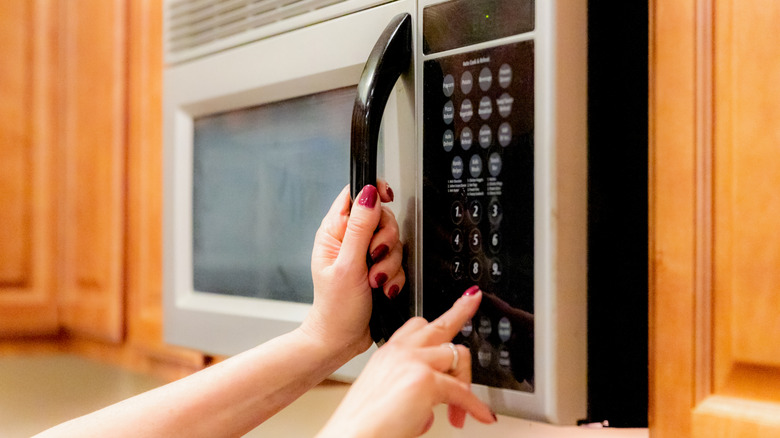What Eating Microwaved Eggs Really Does To Your Body
You don't have to get a pan, pot, or baking dish dirty if you're craving a hot egg dish. All you need is a microwave. In minutes, you'll sit down to a protein-packed feast. But you might wonder if eating microwaved eggs offers special benefits — or potential concerns.
First, know that microwaving your eggs is one of the healthy ways to cook and eat eggs. It's completely safe, as long as you don't microwave them while they're still in the shell. As the shell's contents get piping hot, pressure will build inside it. As a result, the shell could explode inside your microwave, which is messy, or when you take the egg out of the microwave, which can be dangerous. In a 2023 article for Ophthalmology Times, ophthalmologist Dr. Grace Wang expressed concerns that "flying debris" from a microwave-related "eggsplosion" could cause facial or ocular injuries.
Still, microwaving eggs is a potentially advantageous cooking technique that may allow you to get more nutrients in every bite. To understand why microwaved eggs may be eggs-specially nutritious, Health Digest asked registered dietitian Angel Luk for her insights.
Shorter cooking times for improved nutrient retention
"Eggs contain heat-sensitive nutrients including vitamin A, E, and carotenoids," said Luk when asked why microwaved eggs may be a preferred healthy cooking technique. "Microwave cooking time is generally shorter, so theoretically more nutrients are retained compared against longer cooking times using alternative methods."
Researchers have observed nutrient breakdown in some foods that are exposed to heat for long times. For instance, findings from a 2014 study in Food Chemistry showed that the longer that eggs were cooked, the less vitamin D3 they retained. That's important to know, because eating eggs regularly is one of the more reliable (and easy) ways to get the vitamin D3 your body needs.
The experiment indicated that boiling and frying eggs (which are relatively short-term cooking methods) caused a retention of up to 88% of vitamin D3. On the other hand, baking the eggs for 40 minutes led to vitamin D3 retention rates of between 39% and 45%, around half of the shorter-term cooking methods. Since microwaving eggs causes cooking to happen rapidly, your cooked eggs may retain more of their inherent vitamin D3. Other nutrients may also be kept more intact.
Less added fat reduces overall caloric intake
Luk noted another advantage to microwaving eggs: Fewer fats are required for a tasty outcome. Explained Luk, "You may end up using less oil because a light spray into a microwaveable container is enough, while it may be easier to overpour oil into a skillet to fry the egg."
Giving your eggs the microwave treatment isn't without its risks, though. Luk advised double-checking to make sure your eggs were fully cooked since microwaves can cook food unevenly. She cautioned that bacteria can survive in "cold spots," which could lead to a food-borne illness. (Read why the USDA warned against cooking a specific kind of food in the microwave.)
If you're just cooking an egg as is, place it in a microwave-safe dish and pierce the yolk four or five times. Then, microwave the egg on high for 30 to 40 seconds. At that point, check for doneness; if you see undercooked spots, flip the egg and heat it in 10-second increments until it's cooked. To encourage an even distribution of heat, sprinkle a few grains of salt on the bottom of the container. Noted Luk, "Salt helps attract microwave energy."
Feel free to get a little creative with your microwaved eggs, too. Luk mentioned scrambling an egg with diced peppers, chopped spinach, grated carrots, fully cooked shredded or diced lean meat, or a sprinkle of cheese for a quick and easy omelet.



